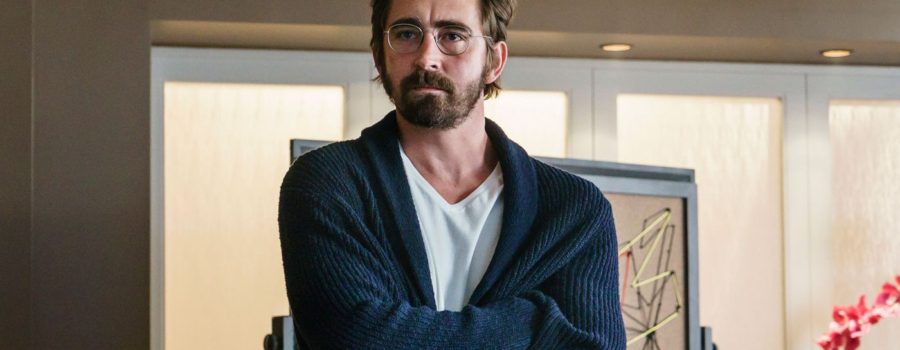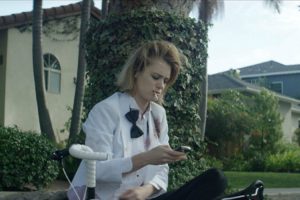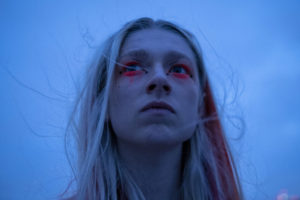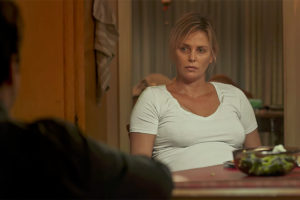Joe McMillan – Halt and Catch Fire‘s Queer Antihero
[Published at Incluvie] Joe McMillan (a mesmerizing Lee Pace) is one of the best halt and catch fire characters ever written across both film and television. From the first episode of Halt and Catch Fire, Joe is brazenly bisexual (Pace is also queer in real life), initially, one of the only aspects, along with his headlong, hasty search for human connection, that he’s comfortable sharing about his elusive personality. Despite this soul-crushing scouring for a seam to hold himself together, like the series’ moniker suggests — a code instruction that forces the computer’s central processing unit (CPU) to cease meaningful operation, causing it to then restart itself from scratch in case of emergencies or issues in user interface — Joe halts his professional and personal relationships before they have a chance to flourish. It’s a skewed fight-or-flight response dating back to parental abuse he faced as a child, setting fire to any remnants of his past (like he did, literally, when he set fire to the first shipment of the Giant computers he worked so hard on with his colleague and unwitting friend Gordon — a tender, heartbreakingly heroic Scoot McNairy — because he knew Apple’s talking Macintosh computer won the personal computing race). This “code,” if you will, also allows Joe to break off these relationships before they can hurt him, as he proceeds to reinvent himself with new people to latch onto who don’t know his flaws.

Joe is scarred on the inside and out. The hypertrophy covering almost half of his abdomen reveals a traumatic past — one that he lies about to his friends Gordon and Cameron (a carefully calculated story about childhood bullies), both in order to manipulate them to join him on his unhinged personal computing odyssey and to hide the pain of his past, which he’s buried deep down in his psyche for decades. It is through the help of Gordon and Cameron (Mackenzie Davis); Gordon’s wife, Donna (Kerry Bishé in a star-making performance); and, eventually, a phenomenal Toby Huss as the character of John Bosworth, or “Bos,” who keep reentering Joe’s professional and personal relationship circles over the course of Halt and Catch Fire‘s eleven-year time setting, that Joe becomes more selfless.
Personal Growth — A Key Component in Halt and Catch Fire Beyond Fame, Fortune, and First-to-Market
Initially, Bos, with his thick, Texas intonation, pooh-poohs Joe’s sexuality, even playing a small part in a prejudiced bogus arrest and beating, further scarring Joe both mentally and physically. However, Bos, raised in a conservative climate with oppressive parents, becomes more liberal, especially when the gang moves to San Francisco and when he, for lack of a better term, “kicks ass” when potential clients offend Joe, and, by proxy, him. These people prove to Joe that, sometimes, friends become family, and family is forever. Instead of burning all bridges and erasing every remnant of the connections that helped build them, Joe carries an artifact with him of each person that helped him overcome his self-obsession with evasive, superficial esteem.

Taking place from 1983 to 1994 during the onset of personal computing, the AIDS epidemic, the internet, and a new generation of activism as represented by Gordon’s lesbian daughter, Haley (Susanna Skaggs), Halt and Catch Fire depicts Joe’s personality flaws as separate from his sexuality. The show allows him to change throughout its run, growing from a cold, “computer AI”-esque almost sociopathic figure into a more whole, caring, and open leader who’s not only unashamed of his tortured past, but also willing to mentor the aforementioned new generation of queer people, like Haley. He helps them become void of shame while learning from his former flaws. Joe embraces this new generation, built on the backs of a generation largely lost to the aforementioned AIDS epidemic, and becomes an activist himself. Joe even becomes a high school humanities teacher at the end of Halt and Catch Fire, an honorable job with a modest wage compared to his former positions of power where he can not only teach young children to pursue their dreams and be themselves, but also, most importantly, enjoy the moment, and live in the now. As Joe expressed in one of his last conversations with Gordon, he finally realized that “what comes next” isn’t what’s most important. It’s his final stage of passing the Turing Test, so to speak. “Most of us in the human race, we don’t get to know what comes next,” Gordon tells Joe. “We just feel shit as it’s thrown at us. This, right now, is all there is. Welcome to the future, Joe McMillan.”
Halt and Catch Fire is About the Necessity for Human Interaction
It’s about the journey, not the destination. As Bos says when he’s attempting to play Cameron’s trailblazing, esoteric, world-building computer game, Pilgrim: “Hell, it’s like you can’t even win.” Cameron responds in an uncharacteristic, enlightening fashion: “Maybe that means everything… and now you can approach the path you take in an entirely new way.” It was never about money, success, or fame for Joe. “Computers aren’t the thing. They’re the thing that gets us to the thing,” Joe explains throughout Halt and Catch Fire. He explains to Cameron that she was always the thing — the human connection was always the thing. When Gordon asks what’s next in 1994, Joe responds: “It was never about where it ended up. It was about how it felt.” Proving that success was never the endgame. “I knew how it would feel to build something with you,” Joe continues. Gordon, too, was the second “thing.” It was always people for Joe, and he ultimately found them at the end of a long, painful, yet illuminating quest for self-discovery outside of one, confident constant — his bisexuality.








Leave a Reply
Your email is safe with us.